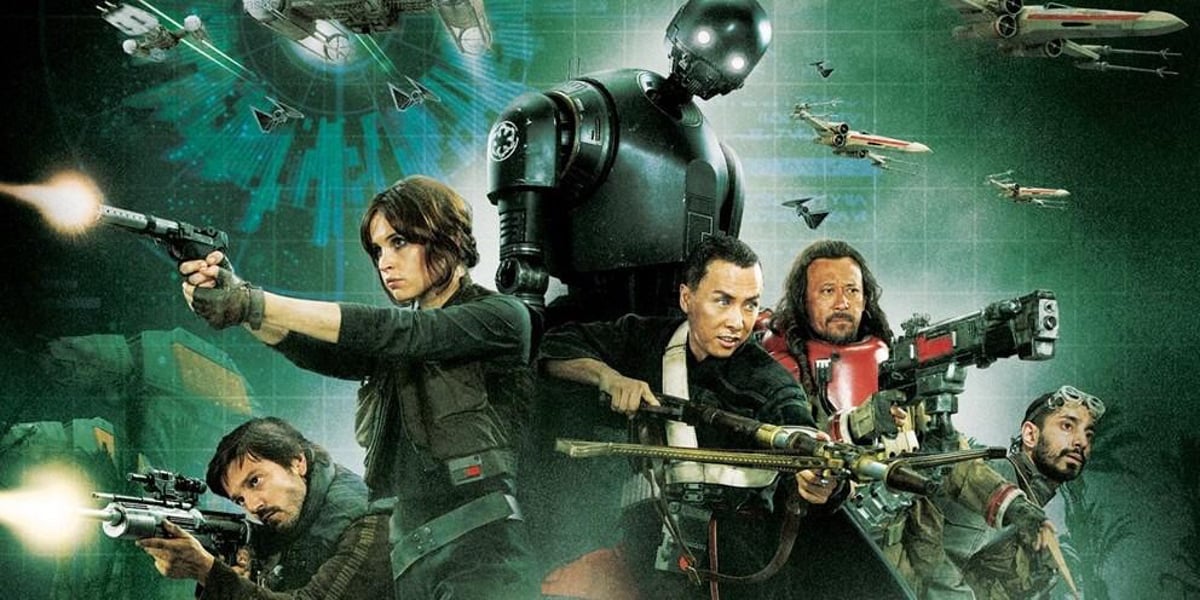Rogue One: A Star Wars Story, Disney’s first Star Wars anthology film, had an interesting production. Lucasfilm famously brought Tony Gilroy on for reshoots and rewrites with about seven months left until release. While the ultimate product brought in huge box office returns, fans have wondered what originally happened in those first versions. Screenwriter Chris Weitz appeared on the podcast Cult Popture to talk about the film and dropped a very interesting reveal.
Weitz, when he was brought on to work on the script, faced a far different ending. “The version prior to that didn’t have everyone die. As a matter of fact, it ended with a wedding. I think it was on the presumption that Disney wouldn’t allow characters to die with such abandon … I felt it was necessary, first of all, because nobody ever mentions them or sees them again … but also because we’ve done this whole sort of theme about sacrifice that it was appropriate that all of our main characters die.”
Weitz revealed some other details as well, such as how they hid the idea that they were on their way to steal the Death Star plans until later in the film, and that the Vader scene that ends the film wasn’t his, but I’m sort of stuck on the wedding idea. Really, ending on a wedding instead of six funerals wouldn’t have made any sense, and this is from someone who actively reads “everyone lives” fanfiction.
A wedding would have turned Rogue One into an entirely different beast based on who would have been getting married. The obvious choice is Jyn and Cassian, which would have been odd considering their past traumas and how they’ve known each other for maybe three days. Jyn/Cassian works as a ship because they don’t have the time they need. It’s tragic in all the right ways.
To end with them throwing caution to the wind and getting married would have been out of character, as well. Jyn is used to being on her own and fighting to survive. Cassian is unpacking the trauma of being in this fight since he was six years old. Neither of that spells “I have just met you, let’s get hitched.”
The only other option would be Baze and Chirrut’s romance being canonized, but even as I say it, it seems like a reach. This is a studio that frequently considers gay characters to be a distraction with no place in their stories. Even though Baze and Chirrut getting married or renewing their vows would make the most sense character wise, I struggle to see that making it into any draft based on the studio’s track record.
Then there’s the idea of ending this particular story with a wedding at all. I’m not opposed to happy endings. My other favorite Star Wars film is A New Hope, and I love a good optimistic ending, but Rogue One needs a tragic one based on the reasons Weitz provides. The themes of sacrifice, the fact that no one does mention the spies who stole the plans … it all spells doom for the heroes.
If Disney had already signed on to the grim ending of Infinity War (and, possibly, the loss of major players in Endgame), it makes sense that they’d allow Star Wars to get dark, too. However, I can see the worry, initially, that Disney would not allow them to go for such a seemingly bleak ending. After all, it’s hard to market a bunch of dead characters.
Still, Disney must be bolder in their more adult-oriented franchises than we initially gave them credit for. Now, if only they’d use that boldness for more inclusion.
Rogue One‘s production was notably troubled, and I doubt we’ll ever get to see the original script or find out who was originally going to get married. Still, if you’re a Jyn/Cassian or a Baze/Chirrut fan, let this fuel your “everybody lives” AUs, because I’ll definitely be reading them.
(via Syfy Wire, image: Lucasfilm)
Want more stories like this? Become a subscriber and support the site!
—The Mary Sue has a strict comment policy that forbids, but is not limited to, personal insults toward anyone, hate speech, and trolling.—









Published: Mar 21, 2019 12:17 pm